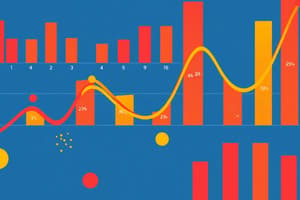Podcast
Questions and Answers
The measures of central tendency include Mean, Median, and Mode.
The measures of central tendency include Mean, Median, and Mode.
True (A)
Simple Linear Regression involves multiple regression equations.
Simple Linear Regression involves multiple regression equations.
False (B)
The chapter on Probability Theory spans from pages 66 to 70.
The chapter on Probability Theory spans from pages 66 to 70.
True (A)
Chi-Square Tests are found in Chapter 6, covering pages 46 to 54.
Chi-Square Tests are found in Chapter 6, covering pages 46 to 54.
Measures of Dispersion include only Range and Quartile Deviation.
Measures of Dispersion include only Range and Quartile Deviation.
Skewness refers to the symmetry of a data distribution.
Skewness refers to the symmetry of a data distribution.
Chapter 8 is the last chapter in the document.
Chapter 8 is the last chapter in the document.
Counting Techniques include only Combinations.
Counting Techniques include only Combinations.
Price Index Numbers include the Fisher and Marshall indices.
Price Index Numbers include the Fisher and Marshall indices.
The document has a total of 65 pages.
The document has a total of 65 pages.
There are 6 chapters listed before Chapter 7.
There are 6 chapters listed before Chapter 7.
Page 35 is listed under Chapter 3.
Page 35 is listed under Chapter 3.
The document is hosted on Paksights.
The document is hosted on Paksights.
Pages 52 to 55 are part of Chapter 6.
Pages 52 to 55 are part of Chapter 6.
The page immediately following Page 64 is Page 65.
The page immediately following Page 64 is Page 65.
Each chapter appears to be separated by blank pages.
Each chapter appears to be separated by blank pages.
Flashcards
Chapter 2
Chapter 2
This chapter likely delves into a specific topic within the larger document.
Chapter 3
Chapter 3
This chapter focuses on a different topic than Chapter 2, continuing the flow of the document.
Chapter 4
Chapter 4
This chapter covers another subject, furthering the exploration of content in the document.
Chapter 5
Chapter 5
Signup and view all the flashcards
Chapter 6
Chapter 6
Signup and view all the flashcards
Chapter 7
Chapter 7
Signup and view all the flashcards
Chapter 8
Chapter 8
Signup and view all the flashcards
Measures of Central Tendency
Measures of Central Tendency
Signup and view all the flashcards
Mean
Mean
Signup and view all the flashcards
Median
Median
Signup and view all the flashcards
Mode
Mode
Signup and view all the flashcards
Quartile
Quartile
Signup and view all the flashcards
Deciles
Deciles
Signup and view all the flashcards
Percentiles
Percentiles
Signup and view all the flashcards
Measures of Dispersion
Measures of Dispersion
Signup and view all the flashcards
Study Notes
Business Statistics Notes for B.Com Part 1
-
Chapter 1: Measures of Central Tendency (Pages 2-23)
- Discusses characteristics of data, including averages (Central Tendency)
- Averages are used to compare populations/samples.
- Key measures include Arithmetic Mean, Geometric Mean, Harmonic Mean, Median, Mode.
-
Chapter 2 Measures of Dispersion (Pages 24-34)
- Examines the variation among data points.
- Range (difference between highest and lowest values) is a simple but crude measure.
- Other measures (Quartile Deviation, Variance, Standard Deviation) provide more in-depth analysis.
-
Chapter 3: Measurement of Skewness (Pages 35-37)
- Defines skewness as a measure of asymmetry in a distribution.
- Discusses methods for calculating skewness using different formulas.
-
Chapter 4: Price Index Numbers (Pages 38-41)
- Discusses various price index calculations (Laspeyre, Paasche, Fisher).
- Explains how to use quantities as weights to determine relevant price changes.
-
Chapter 5: Simple Linear Regression (Pages 42-45)
- Describes a statistical technique to determine the relationship between two variables (x and y).
- Includes regression equations and coefficients.
-
Chapter 6: Chi-Square Tests (Pages 46-54)
- Introduces the chi-square distribution, a statistical distribution used for various analyses.
- Discusses its properties, including its use in hypothesis testing about frequencies.
-
Chapter 7: Counting Techniques (Pages 55-65)
- Explains counting techniques such as permutations and combinations and their applications in probability.
- Tree diagrams for counting outcomes are illustrated.
- Explaining how these rules are applied in different situations (e.g. items being distinct or repeating).
-
Chapter 8: Probability Theory (Pages 66-70)
- Covers fundamental concepts
- Details axioms, classical/empirical approaches for calculating probability.
-
Chapter 9: Sampling Distribution (Pages 71-78)
- Introduces population, sample, and sampling methods.
- Explains procedures like simple random, stratified, cluster and systematic sampling.
- Discusses different characteristics, properties of sampling distributions with a focus on mean (expected value and standard error).
Studying That Suits You
Use AI to generate personalized quizzes and flashcards to suit your learning preferences.




